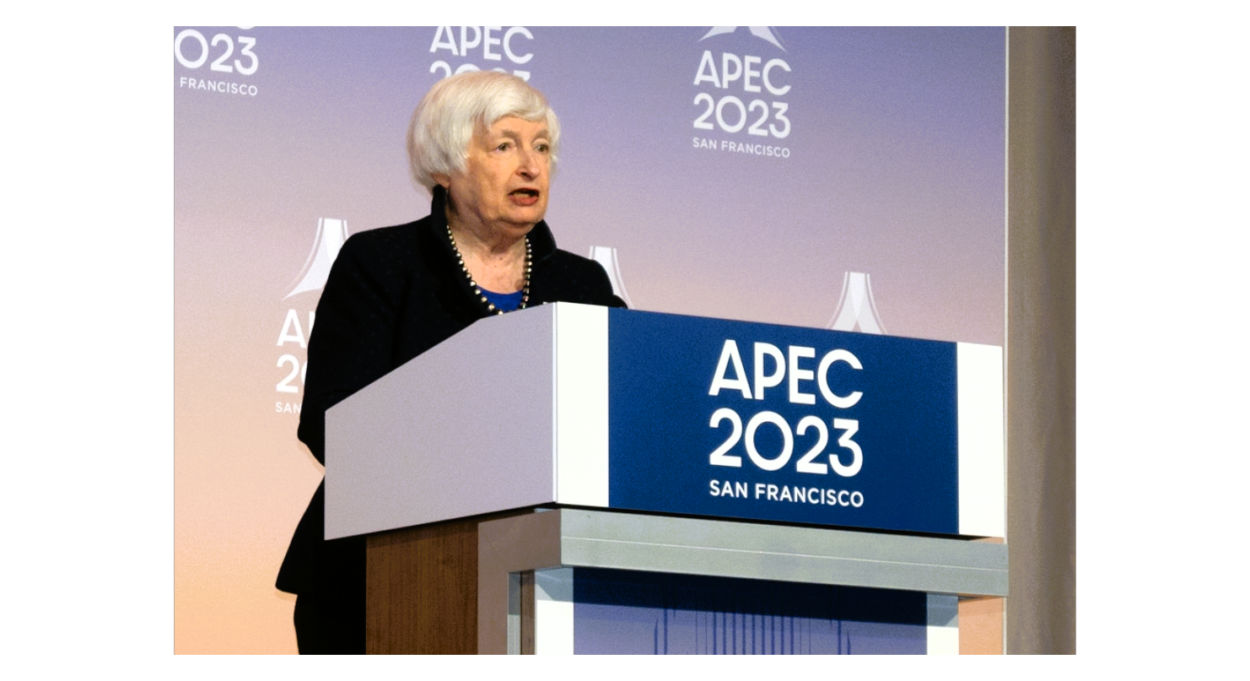SAN FRANCISCO, California — Treasury Secretary Janet Yellen said Nov. 13 that the US and China are on track to build a healthy economic relationship, but it will take hard work from both countries to achieve that goal.
Speaking to reporters here at the end of the two-day Financial Ministers’ Meeting at the Asia Pacific Economic Cooperation summit here, Yellen said managing the US-China relationship is one of her top priorities for the week-long meet of heads of state and business leaders from the Indo-Pacific region.
Yellen’s remarks came ahead of the much-anticipated meeting Nov. 15 between President Joe Biden and China’s President Xi Jinping.
Decoupling Economies
“President Biden and I believe strongly in advancing the values we share with our allies and partners in the Asia Pacific and beyond, while also pursuing a healthy and stable economic relationship with China going forward,” Yellen told reporters. “We hope to build on the foundation we’ve laid to further deepen communication, stabilize the relationship and make progress on key issues. There’s hard work ahead of us, but I believe our engagements here have moved us along the right path,” she said.
Last week, Yellen held a two-day meeting with Chinese Vice President He Lifeng and a separate meeting with China’s Finance Minister Lan Fo’An. The Treasury Secretary said both meetings were productive; the US and China have agreed not to decouple their economies.
China’s economy is experiencing a dramatic slowdown, which may not have much impact on the US, but is certain to have an impact on other countries in the Indo-Pacific region, said Yellen. She also expressed concern about China flooding certain sectors, particularly clean-tech, with its products.
China Dumping
“In my bilateral discussions with the Vice Premier, we did talk about issues of oversupply that have arisen and could arise in the future in industries that China is investing in very heavily,” said Yellen. “And I do consider that a risk. We both endorsed the notion that we should have a level playing field in trade relations. I am concerned about overcapacity.”
Yellen also discussed the Indo-Pacific Economic Framework for Prosperity, a key issue at APEC. She noted that finance ministers had not come to an agreement on all pillars of the trade initiative, which would fast-track trade deals between IPEF partner countries. Critics note that IPEF, launched by the Biden Administration in 2022, contains no process for Congressional oversight or approval of trade deals. IPEF partner countries represent 40% of the world’s economy.
“Reaching a substantial conclusion of the Indo Pacific Economic Framework would be a monumental achievement for IPEF members, addressing issues from climate change to supply chain security,” said Yellen. Three of the four pillars of IPEF have been agreed upon. But the fourth, which deals with trade, has been contentious. “There’s been significant progress, but it is not complete and will still need work,” she said.
“Nevertheless, in a number of areas that I think are critically important to the United States, like supply chains, environment, sustainable finance, we’ve made a huge amount of progress. we’ve made progress on trade too, but it appears not to be complete.”
China is not an IPEF partner country. India is not an APEC country, but is key IPEF country.




